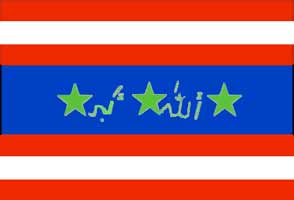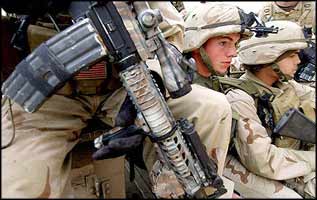Michael Jansen
A report published in the USA press, saying that the new USA embassy in Baghdad would be staffed with 3,000 officers reveals that Washington intends to continue exerting indirect control over Iraq after the occupation regime formally transfers “sovereignty” to an Iraqi provisional government at the end of June.

If the Bush administration gets its way, the only thing left in the state of Iraq by July that isn’t coloured with neo-conservative philosophy will be the Iraqi flag.
While this will not be the largest USA embassy in the Arab world - the Cairo embassy has 7,000 employees, including experts with aid agencies - Washington’s outpost in the Iraqi capital is clearly intended to serve as a base for a USA “governor” and his staff, similar to London’s political installations in countries once ruled by Britain. USA control in Iraq is to be extended by means of the very process designed to effect the “handover of sovereignty”.
The first steps in this process were taken last summer when L. Paul Bremer III took over as the Bush administration’s viceroy in Iraq. He disbanded the 400,000-strong Iraqi army, the intelligence services and police and dissolved the administration, effectively transforming Iraq into a country with no state structures. Then he appointed a 25-member interim Governing Council, choosing its members on the basis of communal affiliation, stirring up sectarian and ethnic tensions throughout the country. This council was meant to serve as the Iraqi face of the occupation regime, name a government and draft a new constitution for the country.
The council has not been a success. Seen by a majority of Iraqis as a tool of the occupation, the council managed to appoint ministers for an interim government which has little credibility, but could not even agree on the way to go about appointing a commission to draw up a new constitution in preparation for elections for an assembly and a legitimate government. On November 15th, Bremer put forward a new proposal for achieving a ceremonial handover timed to boost USA President George Bush’s prospects for a second term in the White House.
During the first five months of the year, 18 provincial committees will be created through a process of dialogue to select representatives for a national assembly which will choose ministers for a provisional government. The USA will attempt to exert control over the process of choosing this assembly in several ways. Five members of the provincial committees constituted to nominate representatives to the assembly will be selected by the council. Five will be chosen by local and municipal councils and five by provincial councils.
The USA administration is at present reconfiguring local councils, allegedly to be more responsive to the will of the Iraqi people, but it is certain that these reformed bodies will do what is expected of them by Bremer. By February 28th, a committee of the Governing Council is expected to present for approval, by Bremer and the body of the council, a “Transitional Administration Law”, a quasi-constitution which will define the nature of the provisional government, the role of Islam, and the relationship to the centre of religious, ethnic and tribal groupings.
Since council members have not been able to agree on the fundamental issues - which must be resolved before this law can be finalised - Bremer is likely to impose his own solutions on the council. He has already compelled the council to accept, against the will of the majority, that, during the transition period at least, Iraq will be a federal rather than a unitary state. This means that the Kurdish areas will continue to enjoy the autonomy given them by the USA when it established a “safe haven” (no-go zone for the government) in 1991. This policy is hotly contested by the Iraqi Arab majority, who see federalism as the first step in Kurdish secession.

Pull-out, what pull-out?
The new ‘sovereign’ Iraqi government will be ‘invited’ to host five USA military bases in any future Iraq, housing 100,000 USA troops.
On March 31st, when bilateral security arrangements are set to be approved, the interim Governing Council will be asked to sign defence pacts with Washington, which will provide for the continued deployment in Iraq of 100,000 USA troops and for the granting to the USA of military facilities. It is significant that these arrangements will be concluded by the Bremer-appointed council rather than the new provisional government, which might have more independence from the occupation regime than the council. On May 31st, a transitional national assembly is to be sworn in. On June 30th, the provisional government, elected by the assembly, will take office and the occupation administration will be dissolved.
USA political and military control over Iraq will be bolstered by economic penetration by major USA firms. During the next six months, the Bush administration will strive to make certain that USA big business will retain the lion’s share of contracts for the reconstruction of Iraq. USA oil companies will also exert domination over the oil sector. This was, after all, a major war aim of the administration.
Over the next few weeks, the Bush administration will proclaim a series of “successes” on the Iraqi scene to project the illusion that the occupation is improving the lot of the hard-pressed Iraqi people who have been deprived of security, jobs, electricity, safe water, fuel and telephones since the war. Top on the list of these advances are the graduation of the second battalion of the “new Iraqi army” (boosting the overall number of troops to 900-1,000 since two-thirds of the first battalion resigned) and the coming into operation of a new cellphone system (the cost of lines, $70, prohibitive for most Iraqis).
Meanwhile, Bremer will project the notion that the occupation is fostering democracy by sponsoring a “national dialogue” at the local and provincial levels. But having a plan does not mean that Bremer will be able to carry it out. In spite of his best efforts, the USA may not be able to manufacture legitimacy for the “handover” process. A majority of Iraqis - backed by Ayatollah Ali Sistani, the head of the Shiite majority community - continues to believe that it should be consulted through elections on both the future polity and on the government of the country. As far as they are concerned, popular consultations were what they expected when the Bush administration promised “democracy”.
Having promised democracy, the administration cannot deliver camouflaged occupation. Iraqis know very well the difference between independence and occupation. After all, the British occupied the country in 1916 and stayed on until 1958, when the revolution toppled the monarchy, Britain’s camouflage.
Article courtesy of the Jordan Times